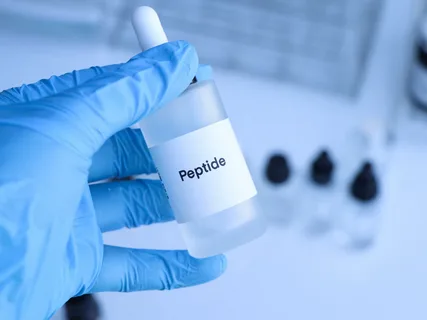Peptide-based therapeutics are on the rise in modern medicine, driving a growing demand for specialized peptide services to support their development and manufacturing.
Peptides, short chains of amino acids, have unique advantages as drugs, offering high specificity and potency with fewer off-target effects than traditional small molecules.
More than 200 peptide therapeutics are now in clinical development, with hundreds more in preclinical stages, underscoring a healthy pipeline of new peptide drugs.
This surge is placing a spotlight on the complexity of peptide development and manufacturing, a challenge that many pharma and biotech companies address by partnering with contract development and manufacturing organizations (CDMOs) offering end-to-end peptide services.
Global Demand Trends and Regional Perspectives
The surge in peptide therapeutics is a global phenomenon, with strong demand seen across major pharmaceutical markets in North America, Europe, and Asia.
In the United States, the trend is evident in the steady pace of peptide drug approvals, with the FDA approving 26 peptide medicines between 2016 and 2022 alone. Japanese biotech innovators have developed proprietary peptide discovery platforms, and the country continues to advance peptide drugs for conditions like diabetes, cancer, and rare diseases.
The global landscape for peptide services reflects these trends. As peptide drug pipelines expand, companies worldwide are seeking manufacturing partners that can produce complex peptides to high-quality standards.
Peptide Therapeutics Gain Traction in Key Disease Areas
Another driver behind the demand for peptide services is the broadening range of diseases being targeted by peptide drugs.
Oncology
In cancer treatment, peptides are being explored both as direct therapeutics and targeted delivery vehicles.
They can be designed to bind specific receptors or antigens on tumor cells, enabling precision targeting while sparing healthy tissue. Investigational peptides can carry cytotoxic payloads or radionuclides into tumors, reducing off-target effects. Some also disrupt protein–protein interactions vital to cancer cell survival.
Established peptide drugs like GnRH agonists have long been used to treat hormone-sensitive cancers. With new peptide-immunoconjugates in development, oncology remains a major focus for peptide therapeutics.
Metabolic Diseases
Metabolic disorders like diabetes have long been treated with peptide therapies, beginning with insulin, the first life-saving peptide drug.
Today, peptide-based drugs such as insulin analogs and GLP-1 receptor agonists play central roles in managing type 2 diabetes by improving blood sugar control with fewer side effects.
Medications like liraglutide and semaglutide also promote weight loss, bridging diabetes and obesity treatment.
Beyond diabetes, peptide services are supporting development for conditions like non-alcoholic fatty liver disease and rare syndromes, where peptide interventions offer precise control of complex metabolic pathways.
Obesity
Obesity has become a global health crisis, and peptide therapeutics are central to recent breakthroughs. GLP-1 analogues like liraglutide and semaglutide, initially for diabetes, have shown impressive weight loss results and are now approved for obesity.
These peptides mimic gut hormones that suppress appetite and increase satiety. Their success has sparked development of new agents, including dual-agonist peptides.
This momentum is driving demand for specialized peptide services to support innovation and large-scale production.
Comprehensive Peptide CDMO Services
Peptide-focused CDMOs provide end-to-end support covering the entire lifecycle of peptide drug development. Key peptide services offered by such organizations include:
- Custom Peptide Synthesis: Chemical synthesis of peptides using solid-phase and/or solution-phase methods, with the ability to produce anything from milligram-scale research batches up to multi-kilogram quantities for commercialization
- Process Development and Scale-Up: Optimizing the synthetic route and reaction conditions for efficiency, then scaling the process from the laboratory bench to pilot plant and ultimately to commercial manufacturing. CDMOs also address scale-dependent issues like solvent handling, reactor design, and batch consistency during scale-up
- Purification: Purification is a critical step, especially for longer peptides where removing truncated sequences or deletion impurities is challenging. Some CDMOs have proprietary high-throughput purification methods to improve yield and cost-efficiency
- Analytical Development: Analytical R&D at CDMOs offering peptide services encompasses stability studies (to determine shelf-life and storage conditions) and the provision of reference standards, all necessary to meet regulatory requirements
- Regulatory Support: Experienced CDMOs, such as Neuland Labs, assist with preparing documentation for regulatory filings, such as Drug Master Files (DMFs) for peptide APIs, and ensure compliance with global cGMP standards
Neuland Labs’ Strengths in Peptide Services
Neuland Labs combines deep peptide expertise with state-of-the-art infrastructure to meet the growing global demand for peptide services.
By leveraging its four decades of industry experience, innovative technologies, and commitment to quality, Neuland serves as a valuable partner for pharmaceutical companies navigating the complexities of peptide therapeutics.
In addition to synthesis, Neuland Labs excels in the critical downstream processes and support services that ensure a successful peptide project. The company has developed proprietary purification technologies that greatly increase throughput, allowing more peptide API to be isolated from crude reaction mixtures with improved efficiency.
As the modern medicine pipeline increasingly includes peptide-based drugs, providers like Neuland Labs stand out for their ability to deliver integrated peptide solutions. From synthesis and scale-up to purification, analytics, and regulatory support, helping to bring the next generation of peptide therapies to patients worldwide.
FAQs
1. Are peptides considered biologics or small molecules?
Peptides occupy a unique space between small molecules and biologics. While they’re chemically synthesized like small molecules, their size, structure, and biological activity often align more closely with biologics in regulatory and therapeutic contexts.
2. How stable are peptide drugs during storage and transport?
Peptide drugs can be sensitive to temperature, light, and pH. Proper formulation and packaging are essential. Many require cold chain logistics, but advancements in stabilization techniques are improving shelf-life and transport options.
3. Why are peptides challenging to formulate as oral drugs?
Peptides degrade quickly in the gastrointestinal tract and have poor absorption through the gut lining. As a result, most peptide drugs are injectable, though research into oral delivery systems is actively ongoing.
4. What makes peptide services different from standard CDMO offerings?
Peptide services involve specialized synthesis, purification, and analytical expertise that standard small-molecule workflows can’t support. From handling long sequences to ensuring high purity, these services require niche infrastructure and peptide-specific process design.





Be First to Comment